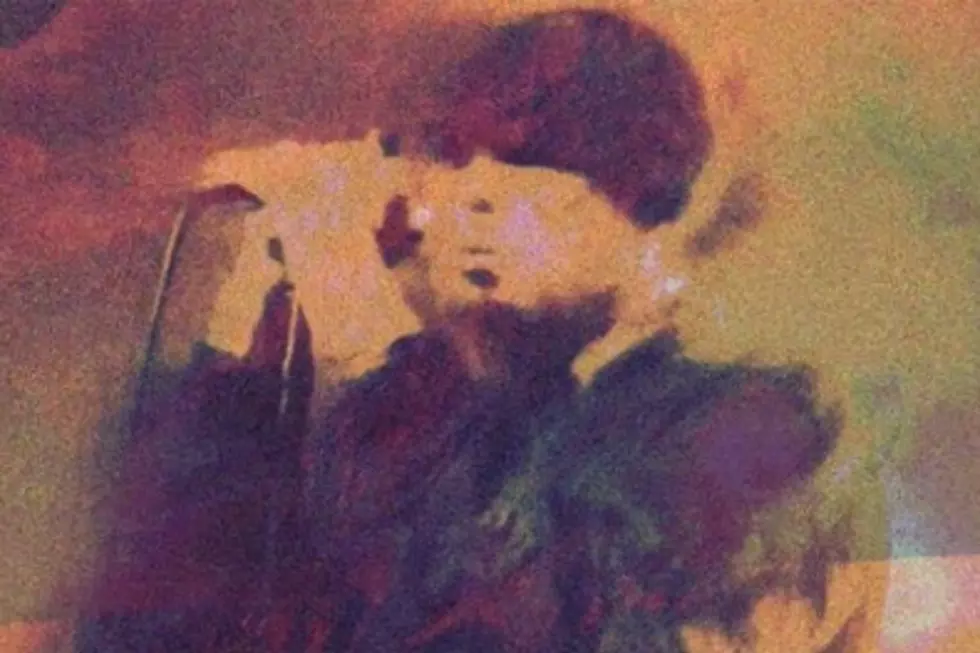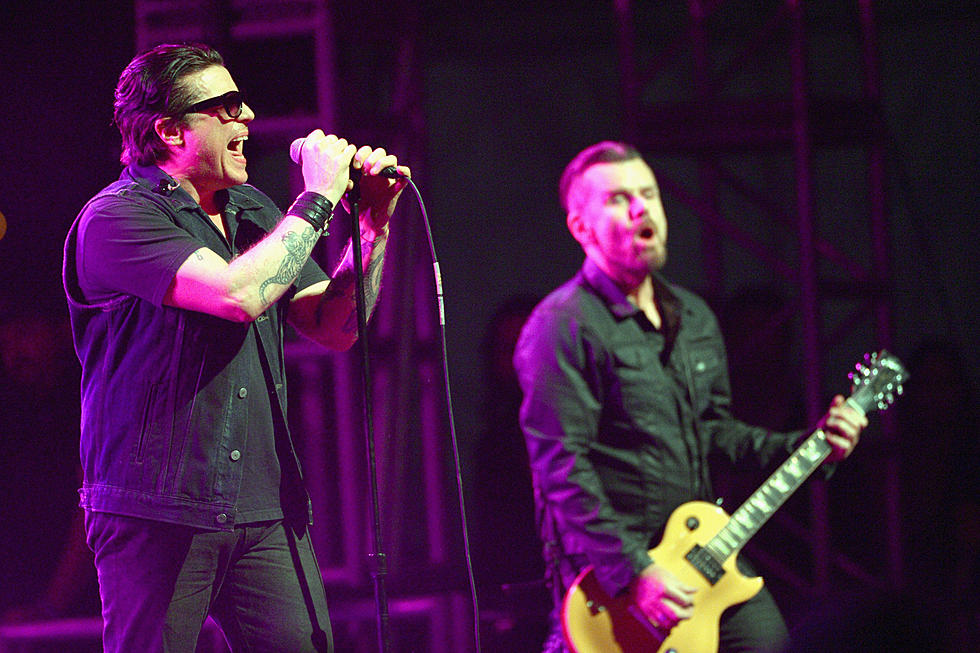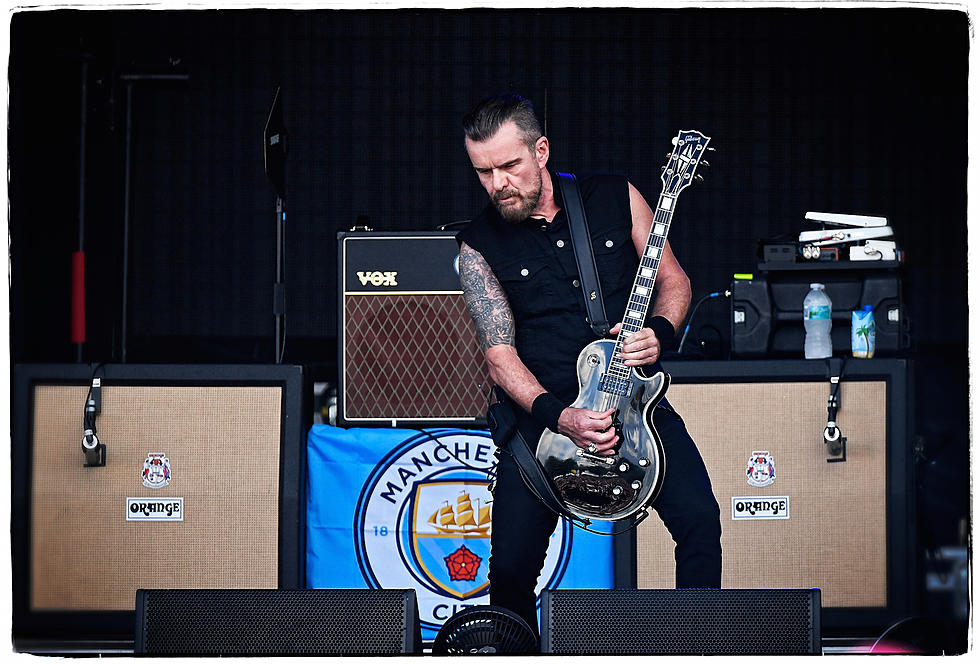
The Cult Guitarist Billy Duffy Talks New Album ‘Choice of Weapon’ + More
It’s hard to believe that Billy Duffy and Ian Astbury have been churning out mind-bending rock tunes as the binding force behind the Cult since the early '80s, but the duo are currently descending upon the release of their ninth studio album ‘Choice of Weapon’ on May 22, along with Chris Wyse on bass and John Tempesta on drums.
The Cult invited their old friend Bob Rock on board to produce the new disc, also co-produced by Chris Goss – both producers pushing the Cult out of their comfort zone and into that magical place where Astbury’s lyrics join with Duffy’s riffs and melodies to become some of the most defining music in modern rock.
You can imagine all the stories the Cult have accumulated throughout their career, and we recently caught up with guitarist Billy Duffy to discuss ‘Choice of Weapon,’ his chance meeting with Bob Rock that would turn into a long-lasting friendship, and the undeniable, and sometimes tumultuous, chemistry he and Astbury have shared for several decades now.
Why don’t you start by giving us a brief update on the band and what’s been going on since you wrapped up your last run of shows. What has the past year been like for The Cult?
The last 12 months we’ve mostly just been trying to pull the new album together, doing the recording in different little sections. Funnily enough, we did quite a few tours, it all becomes a bit of a blur but I think we did the U.K. in January with Masters of Reality with Chris Goss there, that was handy. We thought we’d be able to work on the record with him and that didn’t happen because we were always too tired. I think we were in South America as well, to be honest it’s a bit of a blur these days. It was mostly just touring and various different sessions trying to record the album.
You and Ian [Astbury] have been through your fair share of ups and downs throughout your career together; how would you describe your current working relationship with him, is it in a good place?
Yeah, it’s pretty good, there’s quite a lot more tolerance. I hate to use the word maturity so I won’t use it but I’ll say tolerance and compassion are featured more than they were in the old days – both ways. I think we do understand that we have a natural chemistry between us that is very valuable and special, and creates a certain sound that is unique. For that alone, the pair of us are thankful. That’s enough to have given us nearly a 30 year career really, of making a living making music, which is really all I ever wanted to do. I never really wanted to be a megastar, it’s kind of funny, I always just felt that if I can make a living playing guitar in a band and having some fun that would be it for me. Be careful what you wish for!
Yeah that didn’t turn out too bad for you, did it?
That was it, it all started with reading a book by the lead singer of Mott the Hoople, ‘Diary of a Rock 'n' Roll Star’ by Ian Hunter. He wrote a book and it just chronicled their 1972 tour with some headline shows, some support shows, hanging out with [David] Bowie, just doing various gigs. I read this book as a kid, kind of during my high school band era, and went, oh, that’s all I ever want to be. Turns out I’ve become friends with various members of Mott the Hoople and it’s just amazing. I always just thought if I could just live that lifestyle, that would be it for me so it all adds up.
That’s a great story, I’m sure a lot of musicians can relate.
I’m grateful for it. Ian’s a whole different story, his motivations and reasons for getting out of bed in the morning or in the evening may be different. We all have our own things, but we find enough common ground. We’re both from the Northwest of England so we kind of understand each other. He’s traveled a lot more as a kid but in essence he was born there, close to where I’m from. A lot of people think we’re from Bradford because of the band that Ian was in called Southern Death Cult that formed in Bradford.
I’m from Manchester and Ian’s from just outside of Liverpool originally, although he did live in other places – Glasgow and then in Canada. So in essence, we’re very much not Yorkshire people, not that there’s anything wrong with people from Yorkshire, but we’re not from there as people often report. The other guys in Southern Death Cult were from there. People will come up to us and say, “I’ve followed you since you were in Southern Death Cult in Yorkshire,” and I have to tell them, "No, actually I was in a band with Morrissey in Manchester in 1978."
Yeah we can’t forget about that part of your history.
It just was what it was, but that’s always coming out all the time now. There are so many books written about the bloody Smiths. It was just kind of a fluke.
Given how long you and Ian have been writing together, how does a typical writing session go down? Do you work together or separately and then bring your ideas together?
It’s definitely a collaborative process. At certain times Ian will have a specific song idea, and not all of them end up being Cult songs. He writes a lot of stuff but he doesn’t always feel its right for the Cult. I’ve heard a lot of stuff over the years that we’ve never actually put on a Cult record. Historically I pretty much write the music, I collect guitar riffs as they come to me over the year, and I compile them and I bring them to Ian. We went up to the studio in his house and we went through them all. It’s a meticulous process. We catalog all the riffs and we name them and then we have a bit of fun with it. We start trying to marry Ian’s ideas with those and start to get some vocal sketches on top of them. That’s the process we use.
In reading about 'Choice of Weapon,' there seems to be a lot of implied social commentary; do you feel like lyrically there’s a theme throughout?
I don’t write the lyrics, that’s Ian’s area so I’m really just more of an informed insider on where he’s coming from. I think it’s easiest for me to say that he’s a person who still gives a s--t, he cares, and I think that’s reflected in his lyrics, in whatever theme creeps into a song. A lot of times, as I said earlier, the music will be my riffs first, and that music suggests things to Ian as a palette. That gives him an area to explore, that’s kind of how I’ve seen it work. In our younger days, in the ‘80s men, we were always falling in and out of love so there were a lot of love songs, the kind of stuff you do.
Now were guys 50 years of age, it’s a little different. I think his lyrics reflect that. You become parents and you don’t want to be a teacher, I’m not a preaching type of person, I prefer to live it and not talk about it. People can see how I live and they either dig it or they don’t. I think Ian is kind of like that too, there are recurring themes in the way Ian expresses himself that by now have become very apparent, in the tools he uses, but he pushes himself and he really does care.
Let’s talk about a few of the new songs on the upcoming disc, what can you tell me about ‘Lucifer’?
It was just one of a bunch of riffs that I had laying around, I don’t want to oversimplify it but it really is a basic process. At some point, it happened to me two nights ago, I picked a guitar up and I started playing something and I was like oh whoa, hold on a minute, that’s new and on goes the recording device. So basically for about 10 minutes the bones of a song, or the musical structure of a song – verse, chorus – has been laid down. I don’t know where it came from, nothing will happen for weeks, but I just have to make sure I document it.
‘Lucifer’ has a bit of a [Jimi] Hendrix thing there. When I was a young kid and still to this day, Hendrix was beyond as a guitar player. He was so far ahead of his time, he was really beyond comparison, which is why in my career I’ve never really name-dropped him because to me Hendrix was more like a kind of a deity, I couldn’t understand ‘it’ but what I did love about him was a lot of his production, which people don’t talk about. It’s kind of like, a lot of the effects and the way he laid his music out and the way he makes the records, which might have a lot to do with the drugs he was taking at the time. I enjoyed that sonic picture that Hendrix’ music created. I like a lot of the drum beats, there’s a lot of things about Hendrix, even the pop stuff, because he had a couple of pop hits, I liked a lot of stuff about him. I think ‘Lucifer’ in a way lends itself to some of that. (Read more about what Billy thinks of 'Lucifer' here.)
So do you think that will be the first single?
No, that’s a giveaway track, it’s just a teaser. Apparently there’s a whole new world of music out there and the way to get it out. It’s a teaser, I don’t know what the first single will be, it could be ‘For the Animals,’ but nothing has been decided. We want it to be something upbeat so it wouldn’t be ‘Elemental Light’ for example, which is one of my favorite songs.
I did get a chance to hear ‘Elemental Light,’ I found it quite moody and beautiful.
It’s an interesting one that, not really like anything else on the album.
Yes, I’ve only heard three songs from the new album, but they all have a completely different vibe, do you feel like that diversity is carried throughout the entire album?
Yes, there’s a little bit of everything on it, which wasn’t by design. Writing songs for us is a very organic process and it just happens. We don’t force stuff, we really catalog where we’re at and we have always done that. There have been periods in the '80s where we tried that and it didn’t work. There was a period during this record when [producer] Chris Goss got us to a certain point and we just couldn’t seem to break through, which is why we felt that maybe another producer could help get us over the finish line.
Another producer? Don’t you mean super-producer?
Well yeah, but the funny thing about Bob [Rock] is that I was the first guy to meet Bob. I jammed with Bob in like 1987 in Vancouver. His guitar roadie was a drinking buddy of mine and we were hanging out in Vancouver, probably going to strip clubs, and he said, “My boss Bob is playing tomorrow night, do you want to come down and jam? He’s in a band called Rock and Hyde which use to be Payolas.” I knew nothing about any of this. But he said, “You’ll really get along with him, he loves English music and he’s really kind of an Anglophile with his blonde hair and blue eyes. You should just come down and meet him.” So I showed up and they asked me if I knew this particular Beatles song, which I lied about because I was drunk and thought, how hard can it be? Jumped up and played and became friends with Bob.
Then I learned after that that he was an engineer and working on rock records. I heard that he had produced a band called Kingdom Come, which was a pretty tacky Led Zeppelin rip-off thing, but the sounds that Bob got on that record, were the sounds we were looking for for the Cult on ‘Sonic Temple.’ It wasn’t the content, it was the sonics that Bob was getting - the drums and guitar sounds – and that was the jump. He’d been an engineer on other records but he had only produced Kingdom Come as far as I could tell, this was pre-Motley Crue, pre-Metallica. So in early 1988 I brought it to Ian and our managers at the time. We were getting in a limo, to the L.A. Forum, and this song came on the radio which was a real Led Zeppelin ‘Kashmir’ rip-off by Kingdom Come and I said, ‘Listen, listen that’s Bob Rock’s production, he should produce our album.” The one before had been done by Rick Rubin and George Drakoulias and mixed by Andy Wallace, the king of all mixes, and so we were like “Where do we go from here?” So I thought, how about we go with this unknown Canadian bloke, and to my surprise, everybody went for it including the record company. So yes, Bob is an uber-producer but I still consider him more of a mate.
So, what pointed you towards Bob Rock this time around, was it your friendship with him?
Chris Goss has many talents and I hugely respect him as a musician and a player and a person, but Ian and I had to make a decision. We had been going for so long and we just couldn’t get it over the finish line. We could have maybe gone back for another session with Chris but we just felt like the songs weren’t reaching where we needed them to reach, so it was Ian’s idea to bring in Bob not mine, which is kind of funny actually.
Right, didn’t Ian speak out in the past about not being too happy with some of Rock’s work on your previous albums or was that taken out of context?
It was a little bit taken out of context. We were very much young men at the time, giddy with success in the 80s, so I think he did describe Bob’s production once on ‘Sonic Temple’ as “s--t” but that’s very Spinal Tap. Bob’s done four albums with us now so that probably is more of a testament to what Ian thinks about Bob more than a couple of comments. But Bob would probably agree, it was the 1980s and maybe the ‘Sonic Temple’ production in a few places is a little overblown, maybe, but it’s our biggest selling record other than our ‘Greatest Hits.’
He reached a lot of people, it’s a great record, and it still stands up now. If you think of all the records made in that era, it’s not that bad. You know what I mean? It’s not bad at all. There’s always something you would change about a record. Ian just wants to try new guys and push the record, and that’s very Ian, and I would prefer to stick with the same producer and go deeper. That’s why it’s very exciting to be in a band with Ian because there’s always a bit of a dialogue and it’s kind of fun!
Sonically, if you had to compare this new album to one in your past discography, which one do you think it most resembles?
Like you were saying about the diversity of the tracks, there’s definitely an element of a lot of different records. ‘Lucifer’ is a bit more ‘Beyond Good and Evil,’ which was the Bob Rock record from 2001. To me, there’s a little bit of ‘Sonic Temple’ in there occasionally, there’s songs that are reminiscent of that. There’s quite a few up-tempo songs, plus there’s the capsule being released along with it. We decided not to integrate any of the songs because the capsule has great songs, it’s the EP we did a year ago. So that’s part of this, all of those songs are from the same period; they’re just the first ones we wrote. Ian wanted to try that, he wanted to get new music out to energize the band and energize the fan base, we wanted to get the first four songs out, check Chris Goss out as a producer so that’s what we did. We did it in limited quantities of downloadable tracks, we did it ourselves, we partnered up with a merchandise company so there wasn’t a label. It was kind of guerrilla style, we achieved our objective which was to whet peoples appetite. It was the appetizer platter and hopefully this full album is the banquet.
‘This Night in the City Forever’ and ‘Elemental Light’ are reminiscent of the earlier periods of the band, some kind of sassy rock 'n' roll. I like ‘The Wolf,’ it’s a classic Cult song. It’s kind of like if The Cult had sex with Montrose, that band from the 70s, ‘The Wolf’ would be the baby. There’s a bit of everything and I’m always excited to see how people will take it. It will be interesting to see because the album will become what it is by the way people talk about it.
Download 'Lucifer' From The Cult's 'Weapon of Choice'
More From Loudwire









